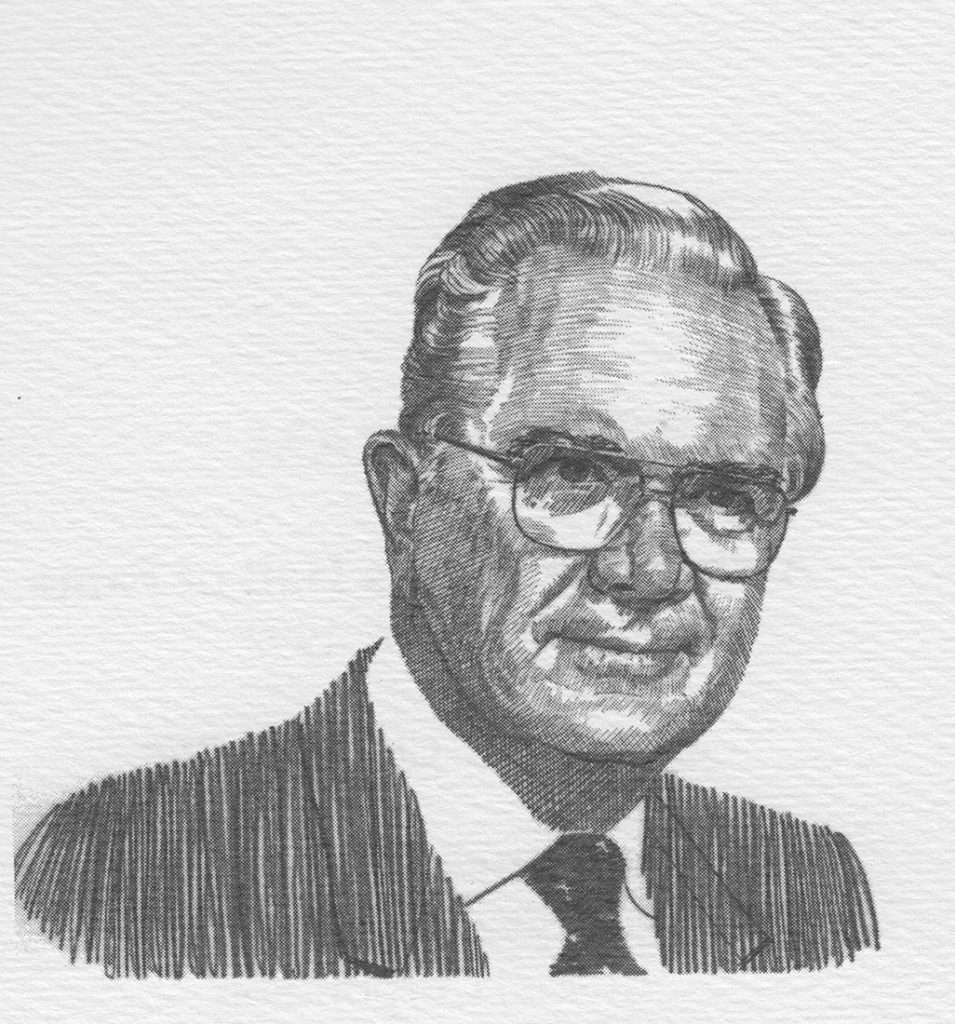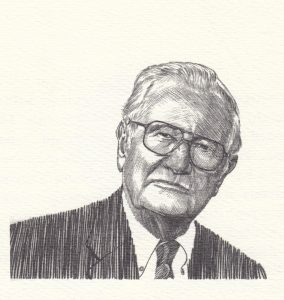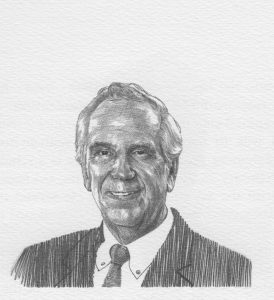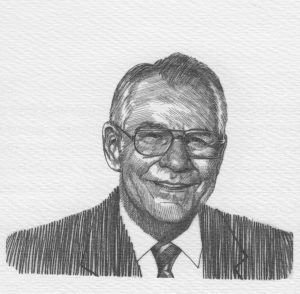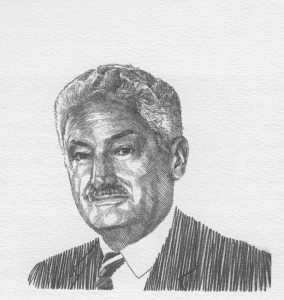In 1941, all Wally Bunn wanted was a summer job with his local telephone company.
He wound up instead with the career of a lifetime.
Wallace R. Bunn was born October 26, 1922, in Durham, North Carolina, to parents Wallace Raikes Bunn and Alda Beck Bunn. In high school, the man who would eventually serve as director of the Hall of Fame Bowl in Birmingham, Alabama, from 1980-1983 was an athletic youngster who became an all-state end in football, served as captain of the basketball team, ran track, and was sports editor of his high school paper. He was also student body president; participated in the chorus, Boys State, and dramatics; and was voted most handsome and most popular. The real high school interest that stayed with him through the years, however, was one Miss Margaret P. Seegers, a dark-haired beauty who caught his eye early on and became his bride on December 19, 1942.
But it was before Wallace and Margaret were wed that he took that first job out of high school, a summer position with the Southern Bell Telephone and Telegraph Company as a coin telephone collector in Charlotte, North Carolina. His original plan was to enter Davidson College in the fall of ’41, but World War II loomed ugly on the horizon, and the money Wallace was earning with the phone company, he decided, would help make entry into college somewhat easier financially if he postponed matriculation for a year. The threat of war did become reality, and Wallace was sent by the telephone company to work with defense installations in a neighboring state. Southern Bell later wrote a letter canceling the position’s military deferment so young Bunn could join up with the U. S. Coast Guard, with which he served from 1943-1946.
His country served, Wallace Bunn returned to the Tarheel State to find that Southern Bell had a job – and work credit of five years – ready and waiting for him. Years later he would talk to an Alabama newspaper about his decision not to take advantage of GI Bill tuition assistance and
pursue his college degree then, saying, “If someone wants to go to college, I would advise them to go. But if you don’t have the desire, then don’t go. I have regretted not going to college, but there are times when I can say I’m glad I didn’t … I got my education the hard way, and you appreciate it more when you get it that way.”
Thus began, for the second time, a career in telecommunications for Wallace Bunn – a career that would culminate in the 1980s when he oversaw the creation of one of the largest companies in the United States after the divestiture from American Telephone and Telegraph Company of two operating companies covering nine Southeastern states.
In 1948 Wallace and Margaret were blessed with the birth of their first son, Rodney. Son Russell would join the Bunn family in 1958, and in between the family would live in Shelby, Winston-Salem and Charlotte, North Carolina, and Hattiesburg, Mississippi, as Wallace began his climb up the Southern Bell company ladder, working as a manager, a district commercial
supervisor, and a district manager. Another promotion, this one to division manager, came in 1959, and with it a move to Baton Rouge, Louisiana. But Wally was not all work and no play; during this time, he also became involved with the Boy Scouts as a Scoutmaster and a trustee. His involvement with numerous civic activities would last through the decades and be one of the reasons cited for his induction into the State of Alabama Academy of Honor in 1984.
Over the years the Bunn family would live in fourteen different cities, with their patriarch serving in increasingly more responsible management positions with each change in locale. They would first call Alabama home in 1962 when Wallace was named assistant vice president of Southern Bell. After a move to Nashville, Tennessee, he would return to Birmingham in 1969, when he was elected a director of South Central Bell and appointed vice president of operations for its five states.
Then came a shift of coastal proportions; Wallace was transferred to Seattle, Washington, as president and a director of Pacific Northwest Bell, in 1973. While in Nashville and Seattle, he served as president of the Chamber of Commerce in both cities. He would return, again, to Birmingham in 1978 as president and a director of South Central Bell.
“There’s a story about us coming back to Birmingham so much,” the business executive once told a reporter. “I had an application in for the Birmingham Country Club for a long time and they finally took me in. I paid my initiation fee and everything. Then I was transferred to Nashville, and I didn’t think I would be coming back, so I gave up my membership. Then I came back to Birmingham and had to pay my initiation fee all over again to get back into the country club. And when I was transferred to Seattle, I knew I wouldn’t be coming back to Birmingham, so I gave up my membership again. Then when I came back the last time, I had to pay the initiation fee all over again – for the third time.
“I tell my wife when I die, to keep a nonresident membership in the Birmingham Country Club. I may come back.”
From 1981 until the historic breakup of the Bell System January 1, 1984, Wallace Bunn was one of the top twelve Bell System officers involved in the planning and execution of the complete divestiture of the Bell Operating Companies from AT&T. Until his formal retirement, he served in Atlanta, Georgia, as the first chairman of the board and chief executive officer of BellSouth Corporation, the largest of the then-newly created “Baby Bells” and the fourteenth largest corporation in the nation, with 125,000 employees at the time. In 1985 he relinquished his position at BellSouth but remained on its Board of Directors through April of 1991 – fifty years after a summer of shaking the nickels out of coin telephones.
Over the years the gentleman named Young Man of the Year by the Hattiesburg Junior Chamber of Commerce in 1958 has served on twelve corporate boards, including those for such companies as AmSouth Bank, Holiday Inn, Morrison, Incorporated, and, currently, Altec Corporation. Civic and philanthropic affiliations have included Chambers of Commerce in many cities, the Salvation Army, Junior Achievement, Urban League, United Way, Rotary Club (including a still long-running stint as Poet Laureate of the Birmingham club), St. Vincent’s Hospital, Baptist Medical Center, and numerous economic development and governmental advisory bodies.
In 1988 this leader in his career field was honored by BellSouth with the creation and endowment of the Wallace R. Bunn Chair of Telecommunications at the University of Alabama at Birmingham. The chair provides leadership for the university’s Center for Telecommunications and Education Research, and Wallace Bunn – who spends his days now golfing, fishing and painting, the dark-haired beauty still by his side – believes that is vital.
“The hallmark of this business is that the progress has never stopped,” he says of his life’s professional work. “I pray it never will.”

